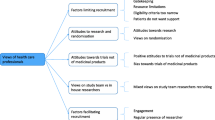Abstract
Purpose
There is a need for periodic review of research priorities in psycho-oncology. The purpose of this research was to conduct a qualitative study designed to canvass the views of health professionals working in psycho-oncology in Australia regarding current priority areas for research in psycho-oncology.
Methods
This study was conducted in two phases. This article reports the results from the first phase, where focus groups were conducted with key researchers and clinicians active in psycho-oncology.
Results
A total of 55 individuals took part in ten focus groups and two interviews. Participants identified 12 priority areas for research. These areas were grouped into four global themes given a significant overlap in the research issues identified. The four global themes are: distress—improving identification, detection, referral and management; specific populations requiring intervention research; the patient journey; and health services research. Key issues identified for each theme are documented along with participant quotes.
Conclusions
This research provides the first steps in identifying research priorities in psycho-oncology and will guide the development of pertinent research studies as well as inform collaborative research studies focusing on clinically relevant interventions. The outcomes of such studies should ultimately guide optimal patient care.
Similar content being viewed by others
References
Holland JC (2002) History of psycho-oncology: overcoming attitudinal and conceptual barriers. Psychosom Med 64:206–211
Kock U (2008) IPOS Sutherland Memorial Lecture: psycho-oncology and health care research. Psycho Oncology 17:533–537
Nehl EJ, Blanchard CM, Stafford JS, Ainsworth S, Baker F (2003) Research interests in the field of behavioral, psychosocial, and policy cancer research. Psycho Oncology 12:385–392
Massie MJ, Holland JC (1984) Diagnosis and treatment of depression in the cancer patient. J Clin Psychiatry 45:25–28
Zabora J, Brintzenhofeszoc K, Curbow B, Hooker C, Piantadosi S (2001) The prevalence of psychological distress by cancer site. Psycho Oncology 10:19–28
Parle M, Jones B, Maguire P (1996) Maladaptive coping and affective disorders among cancer patients. Psych Med 26:35–744
Parle M, Maguire P (1995) Exploring relationships between cancer, coping, and mental health. J Psychosoc Oncol 13:27–50
Weisman AD, Worden JW (1976) The existential plight in cancer: significance of the first 100 days. Int J Psychiatry Med 7:1–15
Given CW, Stommel M, Given B, Osuch J, Kurtz ME, Kurtz JC (1993) The influence of cancer patient symptoms functional states on patient depression and family caregiver reaction and depression. Health Psychol 12:277–285
Sanson-Fisher R, Girgis A, Boyes A, Bonevski B, Burton L, Cook P, the Supportive Care Review Group (2000) The unmet supportive care needs of patients with cancer. Cancer 88:226–237
de Haes JC et al (1985) The quality of life of cancer patients: a review of the literature. Soc Sci Med 20:809–817
National Institute for Health and Clinical Excellence (2004) Improving supportive and palliative care for adults with cancer. London, United Kingdom. http://www.nice.org.uk/csgsp. Accessed 4 April 2009.
National Breast Cancer Centre and National Cancer Control Initiative (2003) Clinical practice guidelines for the psychosocial care of adults with cancer. National Breast Cancer Centre, Camperdown
Turner J, Zapart S, Pedersen K, Rankin N, Luxford K, Fletcher J (2005) Clinical practice guidelines for the psychosocial care of adults with cancer. Psycho Oncology 14:159–173
National Comprehensive Cancer Network (2002) Practice guidelines in oncology—v. 1.2002: Distress management: National Comprehensive Cancer Network.
Canadian Association of Psychosocial Oncology (1999) National psychosocial oncology standards for Canada. Canadian Association of Psychosocial Oncology, Montreal, Canada
National Health Priority Action Council (2006) National Service Improvement Framework for Cancer. Australian Government Department of Health and Ageing, Canberra, Australia
Butow P, Hagerty R (2006) The Psycho-oncology Co-operative Research Group. Cancer Forum 34(5):42–44
Carlson LE, Bultz BD (2004) Efficacy and medical cost offset of psychosocial interventions in cancer care: making the case for economic analyses. Psycho Oncology 13:837–849
Kerr D, Bevan H, Gowland B, Penny J, Berwick D (2002) Redesigning cancer care. BMJ 324:164–166
Yates P (2004) Cancer care coordinators: realising the potential for improving the patient journey. Cancer Forum 28(3):129–132
Farquhar MC, Barclay SIG, Earl H, Grande GF, Emery J, Crawford RAF (2005) Barriers to effective communication across the primary/secondary interface: examples from the ovarian cancer patient journey (a qualitative study). Eur J Cancer Care 14:359–366
Rankin N, Newell S, Sanson-Fisher R, Girgis A (2000) Consumer participation in the development of psychosocial clinical practice guidelines: opinions of women with breast cancer. Eur J Cancer Care 9(2):97–104
Acknowledgements
The authors would like to thank the health professionals who participated in the focus groups and interviews. We would also like to acknowledge the Executive Committee of the Psycho-oncology Co-operative Research Group who supported the conduct of this research. This research was entirely funded by the Psycho-oncology Co-operative Research Group. We acknowledge our funding bodies: Cancer Australia and the Cancer Institute NSW.
Conflict of interest
Nil
Author information
Authors and Affiliations
Corresponding author
Rights and permissions
About this article
Cite this article
Rankin, N.M., Butow, P.N., Price, M.A. et al. Views of psycho-oncology health professionals on priority psycho-oncology research questions. Support Care Cancer 19, 1133–1141 (2011). https://doi.org/10.1007/s00520-010-0922-x
Received:
Accepted:
Published:
Issue Date:
DOI: https://doi.org/10.1007/s00520-010-0922-x




